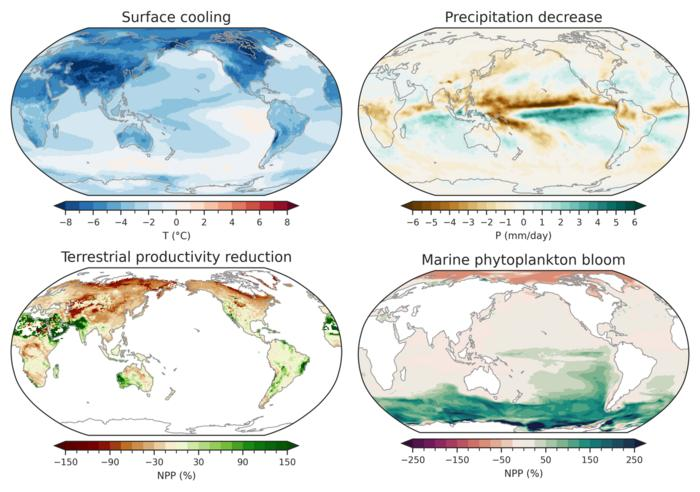News
Scientists simulate collision of asteroid Bennu with Earth in 157 years
Asteroid Bennu is a potentially dangerous object that ranks third on the list of possible future collisions with Earth compiled by Sentry. There is a possibility that it could hit the Earth in 157 years.
Scientists from the IBS Center for Climate Physics (ICCP) at Pusan National University in South Korea have modeled a possible collision. They showed how it could trigger a chain of events that include global winter and drought across the planet, Forbes writes, citing a study published in Science Advances.
The solar system is full of objects with Earth orbits. Most of them pose no threat to Earth, but some have been identified as objects of interest with a low probability of collision. Among them is the asteroid Bennu. Its diameter is about 500 meters, and according to recent studies, the probability of a collision with the Earth in September 2182 is 1 in 2700. According to Eurek Alert, this is similar to the probability of flipping a coin 11 times in a row with the same result.
To model the collision, the researchers used the IBS Aleph supercomputer and ran several scenarios. The worst-case scenario involves 400 million tons of dust, aerosols, debris, and ash entering the Earth's atmosphere after a collision with the Bennu asteroid. Initially, the impact will create a massive crater and cause material to be sprayed into the air near the impact site. This will lead to a powerful shock wave and earthquakes, SNN Science writes. As a result, a solar eclipse due to dust will cause global surface cooling of up to 4˚C, a 15% decrease in global average precipitation, and serious ozone depletion of about 32%. However, at the regional level, these impacts could be much more significant.
"The sharp impact of winter will create unfavorable climatic conditions for plant growth, leading to an initial 20-30% reduction in photosynthesis in terrestrial and marine ecosystems. This is likely to lead to serious disruptions in global food security," explains Dr. Lan Dai, an ICCP researcher and lead author of the study.
In addition, scientists have modeled a scenario in which Bennu collided with the ocean. In this case, it would cause huge tsunamis and release large amounts of water vapor into the air. Such events could cause global depletion of the ozone layer in the upper atmosphere, and this could last for years.
"Climatically active aerosols, including dust, soot and sulfur, can contribute to long-term cooling after an impact. In contrast to aerosol cooling, greenhouse gases such as (carbon dioxide) emissions can cause long-term warming," says Dai.
Scientists also say that asteroid impacts have occurred many times in Earth's history. Early human ancestors may have survived some of these events, resulting in planetary change, and possibly even influencing human evolution and our own genetic makeup.
"This study provides a basis for quantifying the possible impacts of sudden events on early human evolution," Dai says, adding that in the next stage, the researchers plan to study the early human response to such events in more detail using agent-based computer models that simulate individuals, their life cycles, and their search for food.
Only verified information is available on the OBOZ.UA Telegram channel and Viber. Do not fall for fakes!





























